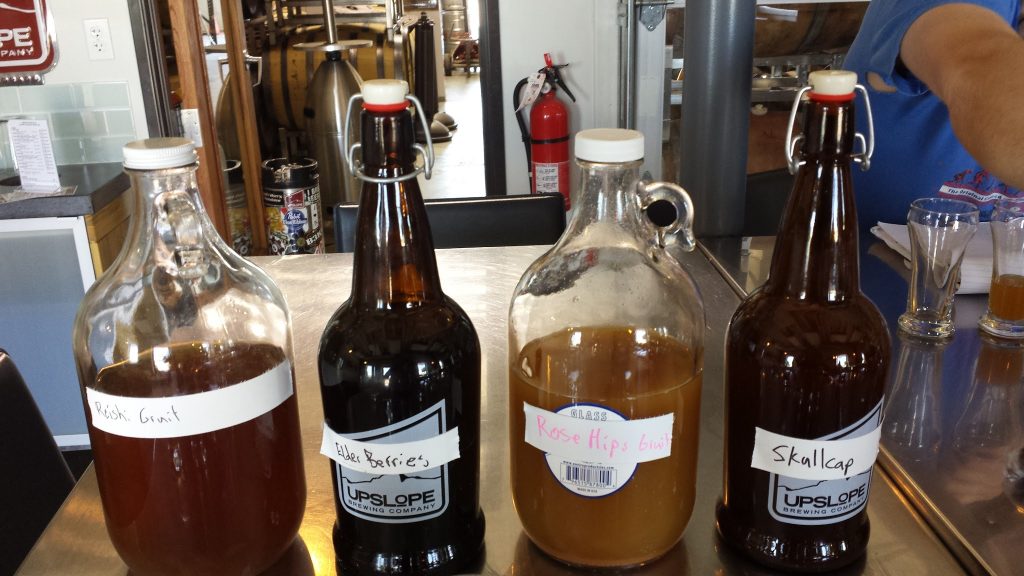Summer Herbal Ale – Hops Free Craft Beer
https://upslopebrewing.com/wp-content/themes/corpus/images/empty/thumbnail.jpg 150 150 upslopebrewing upslopebrewing https://secure.gravatar.com/avatar/f549539a04562a151e1b7b4df20b2009?s=96&d=mm&r=gLast week was all about hops with the celebration of International #IPADay. This week, we’re switching it up and going hop-less with the debut and special tapping of a gruit we’re calling our Summer Herbal Ale. Brewed with local herbalist, Elizabeth Willis, Certified Clinical Nutritionist and Certified Medical Herbalist, this 5.7% gruit was brewed using the following herbs instead of hops: Oregon grape root, skullcap, chamomile, linden, tulsi basil, elderberry, cinnamon, black pepper, coriander, yarrow flower, & hawthorn berry.
Tapping Party this Thursday, August 14
Join us for a special tapping this Thursday, August 14 from 6:00 to 8:00 pm at our Lee Hill tap room! Rebecca’s Herbal Apothecary & Supply will be on site sampling and educating guests on a variety of herbs, while Bumper Crop food truck will be serving up farm fresh eats to pair with our brews.
Guest Blog Post
By local Herbalist Elizabeth Willis, CCH., CCN.
 The tradition of brewing beer was discovered and used independently across the globe between 10 and 30,000 years ago. The beer of our ancestors included the use of 20 different kinds of wild yeasts, 15 different sugar sources and over 200 different medicinal plants. Beer was often considered sacred and was used not only to nourish and relax those who drank it, but as apart of ceremony and religion.
The tradition of brewing beer was discovered and used independently across the globe between 10 and 30,000 years ago. The beer of our ancestors included the use of 20 different kinds of wild yeasts, 15 different sugar sources and over 200 different medicinal plants. Beer was often considered sacred and was used not only to nourish and relax those who drank it, but as apart of ceremony and religion.
This extensive use of grain fermentation and plants in fermented beverages has a colorful history. With the use of their original Lee Hill brewery, Upslope continues the tradition of crafting small batch brews.
What is a Hops Free Beer?
Referred to as “gruit,” hops free beer was the common drink and name for beer in Europe for nearly a thousand years before the common use of hops in beer. Gruit was brewed with, primarily, a combination of three herbs: Sweet Gale (Myrica gale), Yarrow (Achillea millefolium), and Wild Rosemary (Ledum palustre) which were used to temper the sweetness of the grains, add medicinal properties and preserve the drink from spoiling. Gruit was notorious for its ability to alter consciousness, promote well-being and increase sex drive.
Limited Edition – Summer Herbal Ale
Going back to ancient brewing roots, Upslope brewers worked with Elizabeth Willis, Certified Clinical Herbalist and Certified Clinical Nutritionist to create a one of a kind beer – a gruit, Summer Herbal Ale, that not only meets the Upslope standard for great flavor, but delivers a summer beer with plants from the Rocky Mountains.
An Herbalist’s Perspective
Elderflowers & Elderberry, Sambucus nigra
Elder flower is a traditional European herb known as the ‘medicine chest of the country people.’ High in potassium, Elderflower offers nourishment to the body with a light musky, floral scent. Elderflower makes an excellent infusion for cordials, infused wines and champagnes. Elderberry is a cherished immune tonic that is rich in antioxidants, vitamins and has a delicious fruity flavor.
Holy Basil, Ocimum sanctum
A traditional Ayurvedic herb, Holy basil is also called, the “Incomparable One,” and is known for being one of the most sacred plants in India. Holy basil is a powerful antioxidant and used to focus the mind, soothe the body and assist the seeking of higher consciousness.
Chamomile, Matricaria recutita
Chamomile is probably the most widely used relaxing herbs used in the western world. Slightly bitter, Chamomile is used to calm upset babies, soothe teething pains and assist healthy digestion for all ages.
Skullcap, Scutellaria laterfolia
A lesser known mint family plant, skullcap is slightly bitter in flavor and is used in herbalism to calm and relax the body and mind, and promote and sense of wellbeing. This valuable plant grows wild in the foothills of the Rocky Mountains!
Linden, Tilia euopaea
Rich in bioflavonoid’s, this traditional European remedy is relaxing and opening. Linden has a light, delicate and intoxicating aroma and improves a sense of comfort and relaxation.
Oregon Grape Root, Mahonia spp.
Oregon grape is bitter, cooling and cleansing. In 1870, Eclectic doctor John Scudder, MD. describes Oregon
Grape to “right the wrongs” and “and give new tone and new blood to the body.”




